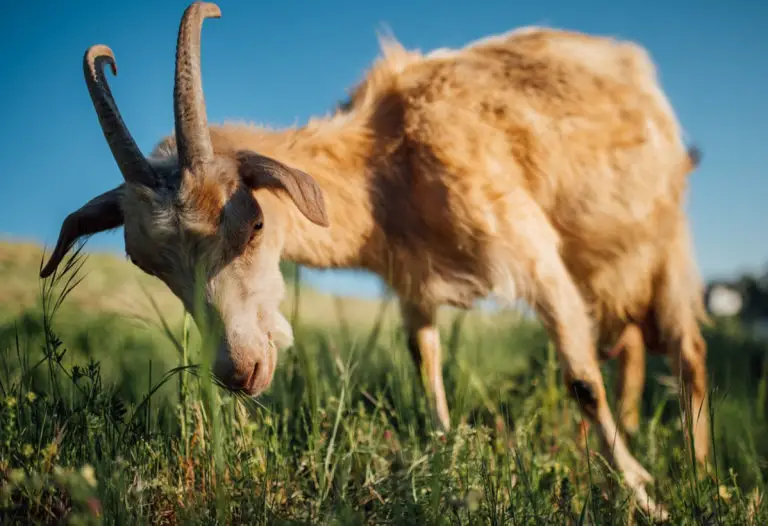No products in the cart.
Goat
What Do Goats Eat For Daily Diet? Treats & Foods To Avoid
Unlike sheep or cows, goats are the least picky ruminants. They can eat anything or everything. As a goat owner, you might wonder, “What do goats eat, and which types of food can you provide them in each of their stages of life?”
Let’s learn about the eating behavior of goats, how to keep them stay healthy, and maximize their growth rate. In this article, I also include some foods that you should never let goats eat.
*This post may have affiliate links, which means I may receive commissions if you choose to purchase through links I provide (at no extra cost to you). As an Amazon Associate I earn from qualifying purchases. Please read my disclaimer for additional details.
What Do Goats Eat?
Hay is goat’s favorite food. In other words, these ruminants take the main part of their nutrients via hay, under the form of grass, legumes, or alfalfa. They also eat long-stemmed hay to maintain the healthy function of their rumen.
On average, a goat can consume from 2 to 4 pounds of hay per day, minus the amount of forage that they have taken on green pasture.
List Of Goats Best Foods
What do goats like to eat? Below are the types of food that are most beneficial for goats that you can feed them daily.
1. Pasture
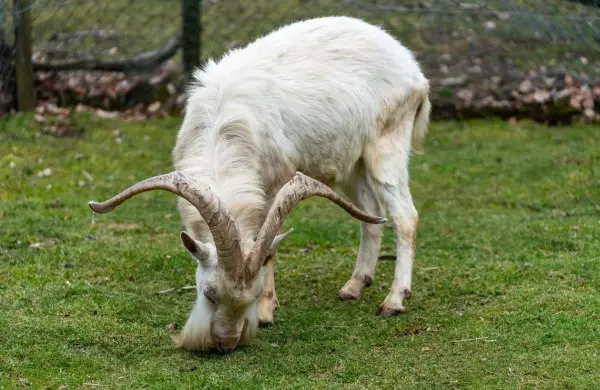
Pasture is the primary and the most economical food for goats on a farm. This food offers them sufficient nutrients for their healthy physical development. Grazing season is excellent for goats in nature. Goats can feed themselves without feeding effort from their owners. The fresh pasture also helps them prevent some contagious diseases or problems with internal parasites.
There is a wide variety of grass depending on your region and climate. But Sudan grass, Bahia grass, Sorghum, Millet, or a grain grass and clover mixture are the best choices for these small ruminants.
Each goat needs around 30 to 50 square feet of fresh grass for grazing. In winter, when pasture is not available, you should provide the other food and supplements to ensure that they are still receiving sufficient amounts of energy and nutrients.
There is some critical information on pasture that you should notice.
- First, when pasture is in its vegetative state, it contains a high amount of energy, protein, and high moisture, making it difficult for these animals to consume enough grass to meet their nutritional demands.
- Second, goats in the early lactation stage often suffer from grass tetany (or the lack of magnesium) when grazing fresh and small grain, ryegrass, or grass/legume mixture. In this case, you should feed them a mineral mixture with 5 to 10% magnesium.
As pasture plants grow older, their palatability and digestibility decline. Thus, you should make regular rotations to ensure that goats enjoy pasture at its highest nutritious state.
2. Hay
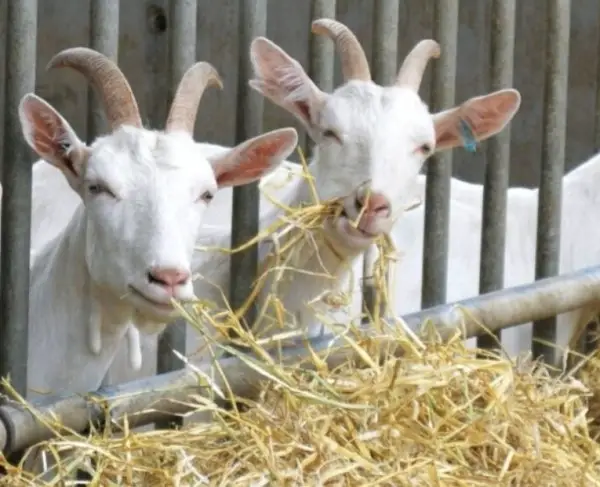
Hay is a particular crop produced to make food for cattle like cows, sheep, or goats. It is an excellent alternative to pasture. It also provides nutrients and energy for all the daily activities of these animals.
Besides, hay keeps them warm in winter since goats have thin skin and no thick coats. Thus, you should always have sufficient storage of hay to feed your ruminants on rainy days or in winter when grazing is not available.
What types of hay are suitable for goats? Weedy or grass hay is cheap yet contains a high amount of protein and essential nutrients. Alfalfa hay is higher in protein, minerals, calcium, vitamins, and energy than grass hays. Therefore, you can feed milking goats with alfalfa hay for optimum milk production. If all of these options are not available in your area, dry grass hay for horses is also acceptable.
Apart from these types of hay, goats also need roughage with long fiber lengths to maintain the proper function of their rumen – their first stomach compartment.
Whatever you choose, make sure that the hay is in good condition and contains no mold by storing it in a well-ventilated place.
Hay can be fed free-choice or twice per day. Each goat needs 2 to 4 pounds of hay daily (or 3-4% of their body weight in pounds) and an adult goat can consume 25 to 30 bales of hay per year.
3. Straw
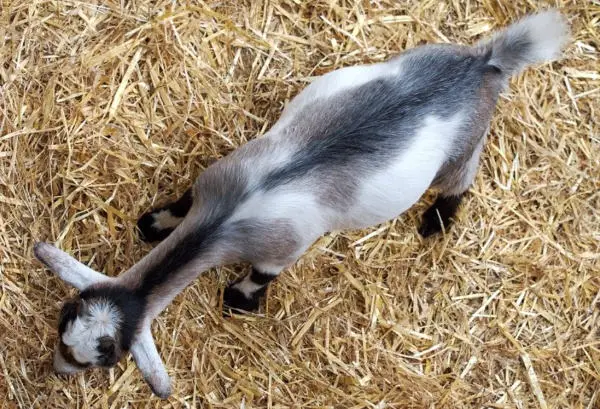
Straw is the by-product of a grain crop and can be easily purchased off the field in August or September. It is cheap and easy to store on any farm.
Although fresh straw contains low nutritional values, goats love eating this roughage because it provides fiber for their digestive system. You can feed them wheat straw, rice straw, oat straw, barley straw, but avoid dusty or damp straw.
4. Chaffhaye
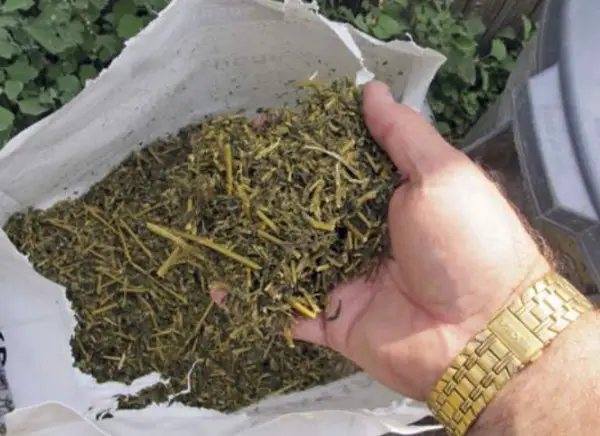
Chaffhaye is mainly small chunks of hay or grass that spread with molasses. If pasture or hay is not available in your region, chaffhaye can be a suitable replacement.
In terms of pricing, chaffhaye is cheaper than hay, so using this feed for your goats can reduce your feed cost. You can utilize this natural food for many animals on your farms, like chickens or cows.
Chaffhaye is not only tasty but also brings many health benefits for goats. Since it is fermented alfalfa, it contains beneficial bacteria for their rumen. Besides, this low-sugar fermented food also provides your livestock with extra minerals, protein, energy, and nutrients.
And since chaffhaye is non-GMO, it is a sustainable source of food to use in the long run. The fermenting process makes it easier to digest fiber, allowing your goats to absorb these precious nutrients effortlessly.
For each ruminant on your herd, you should feed 1.5 pounds of chaffhaye per 100 pounds of their body weight.
5. Grain
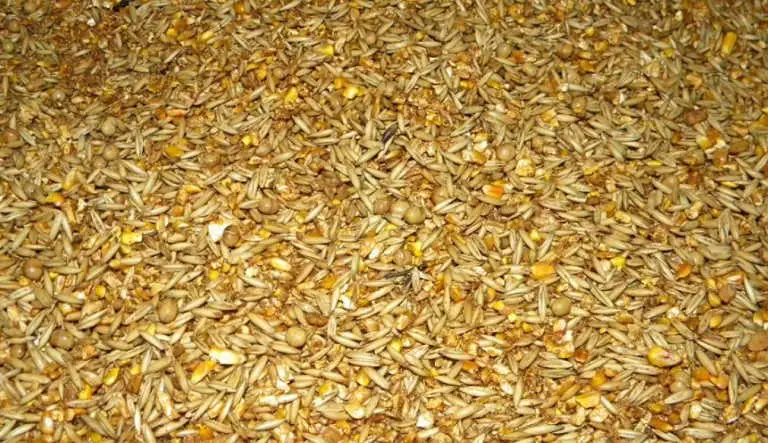
Grain takes up 12 to 16% of your daily goat’s diet. It is an excellent source of energy, protein, and carbon for your ruminants of all species and parts of the world.
The recommended daily grain intake might differ depending on the goat’s age. For example, an adult goat needs 30-40% of the daily feed. Yet, baby one in the weaning period can only digest around 5% of its daily diet.
Grains can be made from oats, corn, rye, barley, moil, or cereal grains – any of them are relatively good. You can choose one or several forms of grain to feed your animals as follows:
- Whole grain: Cheaper than barley and a great source of protein.
- Pelleted grain: Made from alfalfa and high in protein & calcium.
- Rolled grain: A balanced mixture of oats and alfalfa.
- Textured grain: Contains various high-quality ingredients. You should feed your animals 15-18% textured grain.
6. Minerals And Supplements
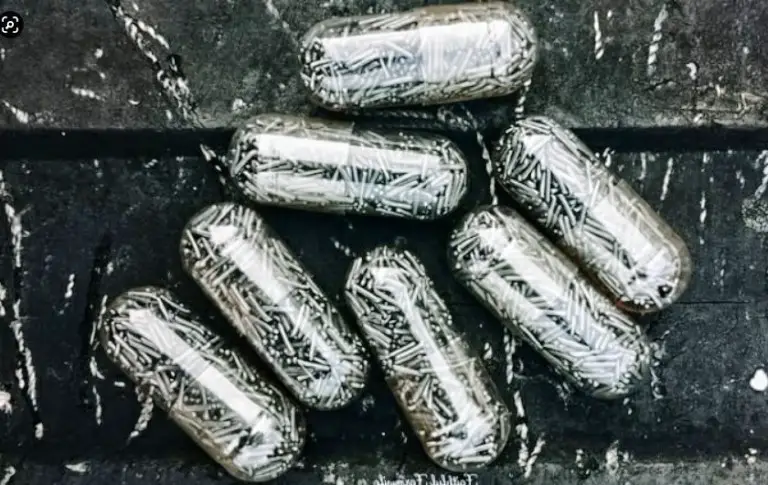
Besides food, goats of all life stages also need calcium, phosphorus, salt, essential minerals, and some vitamins for healthy body development and reproduction. Although they can find these micronutrients in pasture or hay, you should also mix some supplements in their daily feed.
Below are some common types of supplements that you can mix with their daily feed.
- Loose minerals: Goats need loose minerals to get all of the essential nutrients. You can mix in their daily feed or give them mineral blocks to lick.
- Baking soda: Baking soda helps improve the digestion function of your goats and avoids their bloating problem. It can be freely fed with loose minerals.
- Beet pulp: Beet pulp contains high fiber, protein, and energy, making it a healthy treat for your herd.
- Black oil sunflower seeds: This food is high in vitamin E. Thus, it helps enhance the goats’ milk production, reproduction rate or strengthen their muscle. Furthermore, this supplement also contains selenium, iron, and zinc, which is good for your ruminants’ internal and external health. The high-fat content in sunflower seeds helps boost the fat content in their milk and make their coats shiny.
- Kelp meal: Kelp meal is often fed to dairy goats. The high iodine in this supplement helps improve milk quality and production.
- Apple cider vinegar: Since goats have a sensitive stomach, they need to benefit from the enzymes and minerals in apple cider vinegar to avoid digestive problems and improve their immune system. You can add a little of this fruit vinegar to their water bowl.
7. Garden & Kitchen scraps
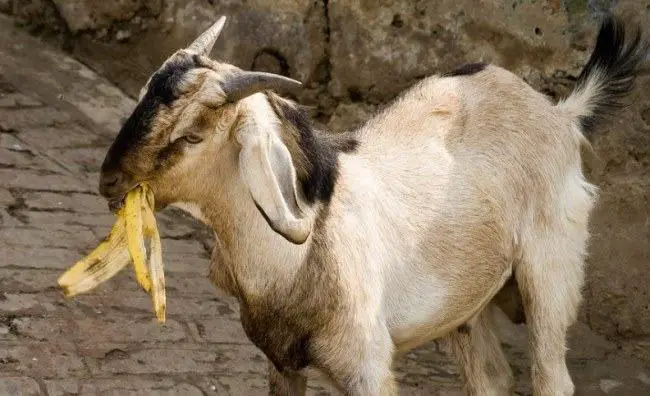
You can utilize garden scraps and food wasted products to save time and feed expenses for your domestic farm. These natural scraps are a healthy type of food for goats alongside hay or pasture.
You can feed them waste products from daily cooking like tomato end, garlic skins, banana peels, orange peels. Safe table foods like veggies, dried or fresh fruits, corn chips, Cheetos, bread, etc., are also suitable for goats.
Weeds are also their favorite food. If you raise goats, you can get rid of unwanted weeds on your property.
Before feeding your herd, you should chop these scraps into small pieces to avoid choking. Also, never feed goats sweet feeds because it can make them lazy and get addicted to these high-fat products.
8. Water
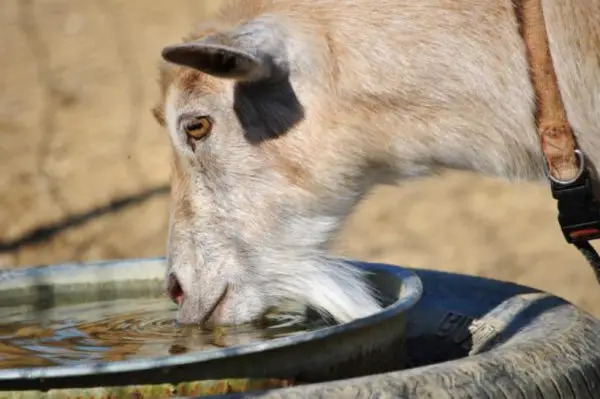
Like humans or other animals, goats need plenty of water to survive and maintain their daily activities, especially if fed with dry foods like hay or grains.
The daily water consumption of goats depends on their age, size, ration, feed intake, and weather conditions:
- On average, adult goats need from 2 to 3 gallons of water per day, while kids only need 2 gallons every day. When lush green grass is available, they can get only 0.5 gallons per day or less in the grazing season.
- A dairy goat in the lactation period needs approximately 3.5 gallons of water daily, with 0.5 gallons of water per gallon of milk she produces. This water intake also depends on its milk production and how much water it gets from grass.
- Goats on high-protein feed need more water, around 1.4 to 1.7 pounds per 1 pound of dry matter.
Goats are more sensitive to drinking water quality than other livestock. To encourage them to get sufficient water intake, frequently check if the water is clean & fresh and make sure it doesn’t contain contaminants or bacteria like coliform or E. coli.
Water temperature is another criterion you should be aware of. The water should be drinkable at an ideal temperature of 15oC (59oF), not too cold or hot. The water consumption of a goat will decline if the water temperature is below 5oC (41oF).
You can also sweeten their water with ACV or molasses to make water more attractive.
What Do Goats Eat In The Winter?
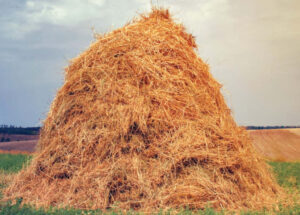
Hay is easy to digest, making it the best food for goats in winter. So, make sure that you always store enough high-quality, mold-free hay for your herd before winter comes. If your goats prefer lush green grass to hay, you can provide them with protein supplements.
Grain foods can be an acceptable alternative for hay. But they are harder to digest, especially for kids.
Besides food, water is essential for goats in dry and cold weather. You should check daily to make sure your animals get enough water. If they tend to drink less, you should warm their water to make them drink it more.
Foods For Baby & Old Goats
For baby goats
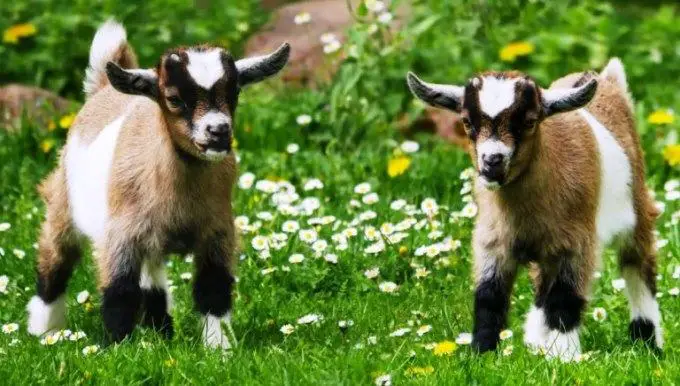
Colostrum, or the first milk produced within 18 hours after birth by a doe, is the foremost food for a newborn goat. It is rich in antibodies, strengthening the kid’s immune system while giving it the best possible start to fight against diseases. Thus, make sure that kids get at least 10% of their body weight of colostrum within 24 hours.
You can start bottle-feeding them in a fixed and strict feeding schedule and proper daily intake from day 2 until their weaning period. However, don’t overfeed them because it can lead to serious health problems like diarrhea, bloat, or death due to Clostridium perfringens.
When do goats start eating grass? They can begin weaning as long as they can digest high-quality hay or pasture from 4 weeks old. But you should wait until they are about 6 to 8 weeks old. Another way to define the exact weaning time is when their current weight is at least 2-2.5 times more than their birth weight, and they can eat plenty of dry food.
When the estimated weaning date comes, slowly reduce the milk replacer intake to make kids get used to their weaning food.
At the first 2 weeks of age, they will start consuming fiber from hay or pasture to boost the epithelial lining of the rumen. This fiber intake is the foundation for their digestive system. After that, they can switch to concentrated, nutritious weaning foods.
For old goats
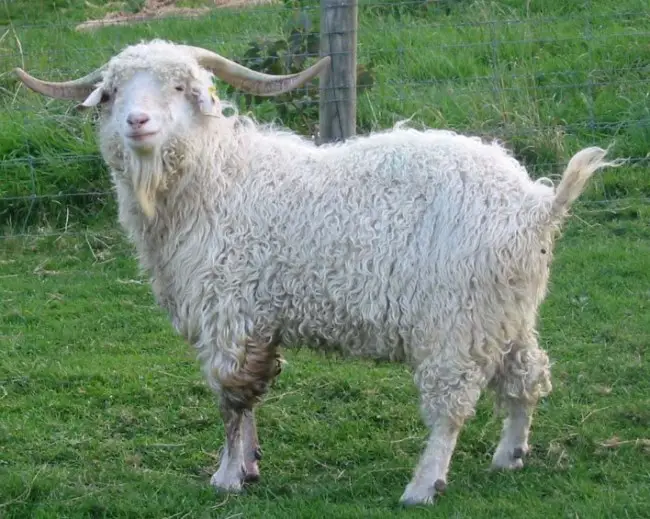
As goats get older, they might have dental issues, like weak teeth or breaking teeth). Thus, they can hardly digest tall, tough pasture grass or hay.
- Frequently check your senior goats’ health to ensure they enjoy their food and get enough daily nutrient and energy intake. Offer them hay pellets & beef pulps with high moisture or pulp & chopped hays that don’t require too much effort for chewing.
- Ask vegetarians to check and remove teeth that are no longer useful or comfortable. For safety, never place your hand near a goat’s molars. Old goats have powerful jaws, and those sharp molars can cause permanent injuries for you.
- Maintain a sufficient daily mineral and supplement intake as older goats can lack essential micronutrients due to their weak chewing and digestion ability. Ask veterinarians for some safe vitamin supplements for your livestock, depending on their needs. Additionally, check if they are suffering from anemia, leading to fatal health problems.
- They can lose weight quickly due to dental issues or some diseases like CAE. Losing food from other goats in the herd can be another reason for their weight loss. Switch to a diet with higher protein to help them maintain a healthy weight.
- Because of their lower activity level, elder goats can also suffer from obesity if still fed the same diet as young goats. Provide them first cutting grass instead of richer cutting to help them maintain a healthy weight.
Whether thin or fat goats, you should monitor their weight to ensure that the new diet is adequate. Before making significant changes to their food or supplement intake, you should ask for advice from your vegetarian.
What Should You Not Feed Goats?
You should never feed your ruminants dirty or unhealthy food since it can lead to serious health problems. When feeding them, be attentive not to mix trash like wasted paper or cigarettes into their food.
Pet foods for your dogs and cats are also not advisable to use as goats’ food. Besides, avoid feeding them with avocado, chocolate, milkweed, crotalaria, wild cherries. Plants that contain oxalates, like kale, lilacs, lily of the valley, holly trees or bushes, rhubarb leaves, nigh-shade veggies, peach/palm leaves, are also poisonous for them.
Although goats are smart enough to define toxic plants, they can be poisoned if being fed with an excessive amount of the following plants:
- Berries, including China berries, Baneberry, Elderberry, Inkberry.
- Weeds: like Buckwheat, Pigweed, Pokeweed, Milkweed, Redweed, Nightshade, Staggerweed, Sneezeweed, Rattleweed, Jimsonweed.
- Grass: like Johnson Grass, Sudangrass, Sorghum, Velvetgrass.
- Lawn/Backyard Shrubs: like Oleander, Boxwood, Carolina Allspice, Rhododendron Wild Hydrangea, Virginia creeper, Black Locust Buckeye
- Cherries: including Chokecherry or Black Cherry.
- Lily
- Ferns
- Corn Cockle
- Poppy
- Poison Ivy
How Do Goats Eat?
Goats don’t directly benefit from their food but their fermentation. Their stomach is divided into 4 chambers (with rumen as the largest one) to ferment and break down food into solids. After that, they will get and digest the nutrition from those fermented solids.
Goats don’t eat anything or everything they see. They are picky browsers and love a wide variety of food. They are cautious about the grass, weeds, leaves, or hay they are about to digest. Sometimes you might find them eating cigarettes or paper, but they do not digest this junk. They can eventually die of eating poisonous or not digestible foods (for example, chocolate or lily of the valley).
As a goat owner, you should feed them healthy food for their physical growth and weight.
Important Rules When Feeding Goats
Below are some essential rules for a prosperous goat farm:
- Goats should be fed a balanced diet of high-quality pasture (25%), grain (20%), hay, and water.
- Supplements and minerals are vital for the healthy growth and reproduction of commercial goats.
- Long roughage with high fiber content should be fed regularly to goats to maintain their proper rumen function.
- You should feed foods that are suitable for their ages and breeds.
- Avoid sudden modifications in their daily diet.
- All goats on your farm should be fed equally with no competition.
- You should clean their food and water containers regularly to avoid the growth of bacteria, germs, and parasites.
- You should frequently check their body condition and give adequate improvements.
FAQs (Frequently Asked Questions)
1. What do goats eat in the wild?
Wild goats can eat all plants available in their living environment, including some poisonous ones. Their digestive system can digest various types of food. In harsh weather conditions, they can even try to eat dry hay or plant roots.
2. What do mountain goats eat?
Mountain goats spend most of their time grazing on lush green fields. They can eat various plants like woody plants, lichens, mosses, grasses, bushes, berries, roots, and edible plants. They can switch to dry weeds, brush, grass, or plants beneath the snow in winter.
3. What vegetables can goats eat?
Goats love eating healthy fruits and veggies, like watermelon, peaches, bananas, pears, grapes, lettuce, apples, carrots, celery, pumpkin, spinach, and squash.
4. Why do goats eat paper?
Goats are browsing animals, so they love chewing or tasting random things like paper, cardboard, or clothing. But they don’t digest these junks.
5. Why do goats eat cans?
Goats don’t eat cans. Instead, they love browsing and tasting different objects with their lips.
6. Why do goats eat tree bark?
Since goats are voracious browsers, they can eat anything on their way, including tree barks. Unfortunately, this weird type of food can be fatal to their digestive system. Therefore, you should hide the tree barks from those roaming ruminants.
7. Why do goats eat dirt?
Several reasons make goats eat dirt. In most cases, they could have some health issues, like a mineral deficiency in their diet. Any parasitic infestation or some problems with their intestines can also result in this situation. Sometimes, they eat dirt because they are just bored.
8. Why do goats eat their placenta?
Goats eat their placenta shortly after birth for two reasons.
First, the placenta is a special gift for them after a painful labor process. Eating placenta helps them preserve the nutrients in their placenta (like protein, fiber, potassium, and hormones like testosterone).
Second, consuming the placenta helps mother goats protect their kids from predators in the wild.
9. How do goats eat poison ivy?
Goats in the wild have to live in arid areas. They have to survive on any plants available in their environment, including toxic plants. For that reason, their digestive system has developed the ability to detoxify harmful compounds in poison ivy better than cattle or sheep.
10. How do goats eat thistles?
Although goats can help farmers eliminate unwanted plants like thistles, they only consume them at the right stage.
Therefore, you can make them eat thistles by moving them into the weedy or bushy thistles for a few days and letting them eat all these leaves and small branches. After that, move them out to let these thistles recover, then move them in again. Do it several times with patience. Then you will weaken these thistles and make them die.
11. How do goats eat blackberry bushes?
Goats are excellent mountain climbers. They can jump up to the highest leaves and take the blackberry bushes down. A goat herd can flatten a remarkable area of blackberries.
12. How do goats eat thorns?
Since goats have hard gums, they can chew thorns with no damage to their mouths. Their stomach has four chambers, allowing them to digest roughage like thorns or tree barks.
Final Words
After asking, “What can goats eat and their eating behavior?”, you know that goats are browsers. They can absorb a wide range of food like pasture, hay, grains, etc. When providing them with healthy food, they will grow happily and be more profitable for your farm.
